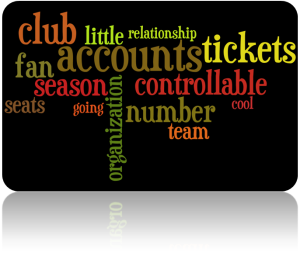 The New York Knicks are terrible – 9-37 as of today. And with the highest ticket average ticket prices in the NBA at almost $130 per seat per game, fans aren’t happy according to a recent New York Times article. Many even want refunds! Yet, the Knicks repeatedly report attendance near capacity. How? To a large extent, it’s about supply and demand. But most sports organizations are not located in a city of over 8 million people, so when the product on the court (or field, pitch, track, or rink) is terrible, what can be done? This is when the season ticket service and sales representatives of the world have to focus on what they can control. Here are some things that reps can control, which have nothing to do with the team’s performance:
The New York Knicks are terrible – 9-37 as of today. And with the highest ticket average ticket prices in the NBA at almost $130 per seat per game, fans aren’t happy according to a recent New York Times article. Many even want refunds! Yet, the Knicks repeatedly report attendance near capacity. How? To a large extent, it’s about supply and demand. But most sports organizations are not located in a city of over 8 million people, so when the product on the court (or field, pitch, track, or rink) is terrible, what can be done? This is when the season ticket service and sales representatives of the world have to focus on what they can control. Here are some things that reps can control, which have nothing to do with the team’s performance:
- Your relationship with your accounts
- Your knowledge of their renewal drivers
- Your knowledge of which of your organization’s services, information, programs, and solutions can address those drivers
- How often you reach out to them personally
- How you reach out to them personally (preferably in the way your client prefers)
- Your understanding of how they’re leaning toward renewals
- Your understanding of their favorites – players, visiting teams, aspects of the game experience
- Your knowledge of why fans of similar profiles have left in prior years
- Your knowledge of their share partners
- Your knowledge of what benefits are most important to them – and which are irrelevant
- Your understanding of how they use their tickets
- Your knowledge/skills about how to deal with the irate customer
What’s the key takeaway?
You can’t control the play on the court. But your knowledge of your account, your personal skills, how/when you communicate with your clients – those are all things you can control. It’s very easy (and understandable) to look at the play on the court and be frustrated. To get over the frustration, focus on what you can control. Work on your knowledge, skills, and communication with clients.
Build yourself up to build renewal rates.
Did you like this post? Here are other Sports-related posts:























